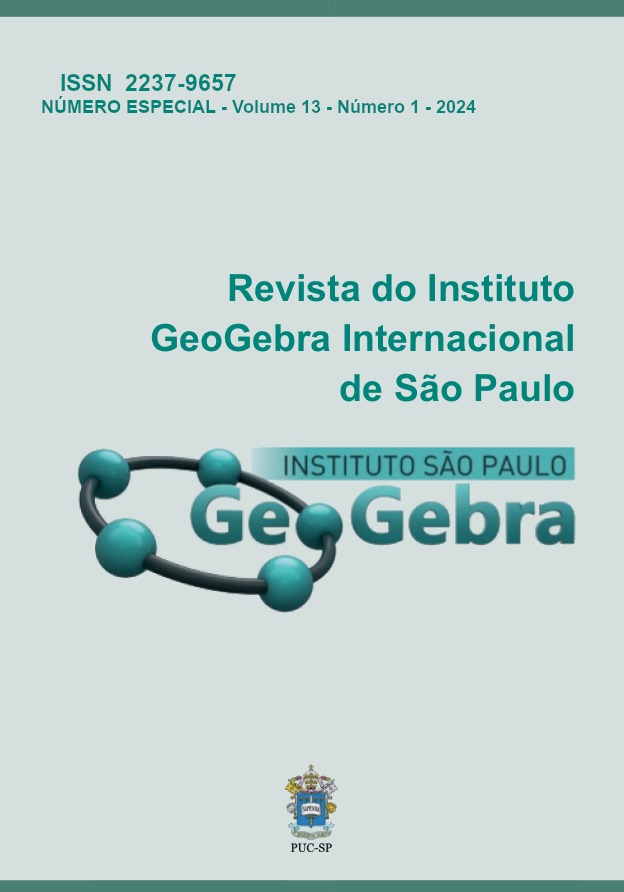The use of GeoGebra as a didactic alternative in the teaching of functions of the first degree: An experience in 8th grade in the Mozambican context
DOI:
https://doi.org/10.23925/2237-9657.2024.v13i1p124-160Keywords:
Functions, GeoGebra, teaching and exploratory learningAbstract
Following our participation in a training workshop involving GeoGebra and STEAM Education, with thematic modules, planning sessions, simulation of lessons in a training context, classroom monitoring and lesson reflection, an experiment was carried out with Grade 8 pupils (Classes A. B and C - familiarisation phase) at Lhanguene Primary School - Pilot, B and C - phase of familiarisation with GeoGebra), at the Complete Primary School of Lhanguene - Pilot, in the study of proportionality, 1st degree functions, solving a system of two equations with two unknowns using the graphical method (Class C), using GeoGebra software. We opted for a fundamentally qualitative, exploratory, descriptive and interpretative study. GeoGebra was used to provide an active method where students discover the concepts and principles behind an observed phenomenon. This article aims to present the main results of this experiment in the light of the Mozambican context, where technologies are still used in a timid way in teaching.
References
ARTIGUE, M. (2016). Os desafios do ensino de matemática na educação básica. París: UNESCO. 2016.
BOERI. C. A. N.; VIONE, M.T. Abordagens em educação Matemática. 2009.
D`AMBRÓSIO, U. Educação Matemática: da teoria à prática. Campinas: Papirus, 1966.
ERICKSON, F. Qualitative methods in research on teaching. In M. C. Wittrock (Ed.), Handbook of research on teaching (pp. 119-161), 1986.
ESTEVES, J. M. Mudanças sociais e função docente. In: Nóvoa, A. (Org) (2014). Profissão Professor. 2ed. pp. 93-124. Porto: Porto Editor., 1999.
FERNANDES, Dárida; FERREIRA, Juliana Vaz Almeida Gomes. As Potencialidades do GeoGebra no 1o Ciclo do Ensino Básico The Potentialities of GeoGebra in tht Ist Cycle of Basic Education. Revista do Instituto GeoGebra Internacional de são Paulo. ISSN 2237-9657, V. 9, N. 2, P. 52-77, 2020.
FREITAS, Maria Teresa Menezes; FIORENTINI, Dário. As possibilidades formativas e investigativas da narrativa em educação matemática. Revista Horizontes, v. 25, n. 1, p. 63-71, 2007.
HENZ, Carla Cristina. O uso das tecnologias no ensino-aprendizagem da matemática. Trabalho de graduação (Licenciatura em Matemática), Departamento de Ciências Exatas e da Terra, da Universidade Regional Integrada do Alto Uruguai e das Missões – URI – Campus de Erechim.
INDE/MINED-Moçambique. Matemática Programa da 8a Classe, Diname, 2010.
LIBÂNEO, J. C. Didática. São Paulo. Cortês Editora, 1994.
MORAN, J. M.; MASSETTO, M. T.; BEHRENS, M. A. Novas tecnologias e a mediação pedagógica. 13. Ed. Campinas, SP: Papirus, 2006.
MORAN, José, M; MASETTO, Marcos, T.; BEHRENS, Marilda, A. Novas tecnologias e mediação pedagógica. Ed. Campinas, SP: Papirus Editora, 2017. ISBN 8544902464, 9788544902462.
[NCTM] National Council of Teachers of Mathematics. Princípios para a ação: Assegurar a todos o sucesso em Matemática. Lisboa: Associação de Professores de Matemática. 2017. (Obra original em inglês publicada em 2014).
NÓBRIGA, J. C. C.; SANTOS, G. L.; ARAÚJO, L. C. L.; FEREIRA, B. S.; LIMA, R. GGBOOK: uma interface que integrará os ambientes de texto e gráficos no GeoGebra. Revista do Instituto GeoGebra Internacional de São Paulo, São Paulo, v. 01, n. 01, p. 03 - 12, 2012. ISSN 2237 - 9657.
OLDKNOW, A.; Carol KNIGHTS, C. (Ed.). Mathematics Education with Digital Technology (Education and Digital Technology, pp. 251– 256). Bloomsbury Academic, 2011. Retrieved August 27, 2022, from http://dx.doi.org/10.5040/9781472553119.ch-027
OLIVEIRA, D. Políticas de formação continuada de professores. In D. Motta de Oliveira (Ed.), Formação continuada de professores: Contribuições para o debate (pp. 17-28), 2012. UFJF.
PONTE, J. P., SERRAZINA, L., GUIMARÃES, H. M., BREDA, A., GUIMARÃES, F., SOUSA, H.,
MENEZES, L., MARTINS, G. & OLIVEIRA, P. (2007). Programa de Matemática do Ensino Básico. Lisboa: ME-DGIDC.
PRODANOV, Cleber Cristiano; DE FREITAS, Ernani Cesar. Metodologia do trabalho científico: métodos e técnicas da pesquisa e do trabalho acadêmico-2ª Edição. Editora Feevale, 2013.
PROFÍRIO NICAQUELA, W. .; INÁCIO ASSANE, A. . A formação de professores primários em Moçambique: qual modelo a adotar?. Argumentos - Revista do Departamento de Ciências Sociais da Unimontes, [S. l.], v. 18, n. 1, 2021. Disponível em: https://www.periodicos.unimontes.br/index.php/argumentos/article/view/3840. Acesso em: 28 dez. 2023.
REGÔ, Rogério Gaudêncio. Um estudo sobre a construção do conceito de função. Tese (Doutoramento em educação), Faculdade de Educação, Universidade Federal do Rio Grande do Norte, Natal, 2000.
SAMPIERI R., H., COLLADO, C. F., & LUCIO, P. B. Metodologia de Pesquisa. S. Paulo: Mcgraw Hill, 2006. ISBN: 85-8680493-2.
SANTOS, C. M; NEVES. T. G; TOGURA, T.C. F. As tecnologias digitais no ensino de matemática: Uma análise das práticas pedagógicas e dos objetos educacionais digitais. 2016. Disponível em: https://www.sbembrasil.org.br/enem2016/anais/pdf/5245 2978 ID. pdf. Acesso em: 21 de out. 2023.
SILVEIRA, A. P. R. (2015). O GeoGebra na formação e aprendizagem de transformações geométricas isométricas no plano euclidiano. Tese (Doutoramento em Multimédia em Educação), Departamento de Educação, Universidade de Aveiro. Repositório Institucional da Universidade de Aveiro.
Downloads
Published
How to Cite
Issue
Section
License
Copyright (c) 2024 Revista do Instituto GeoGebra Internacional de São Paulo

This work is licensed under a Creative Commons Attribution 4.0 International License.
Submission, processing, and publication of articles sent to the journal and registration of the DOI at Crossref is free of charge.
Authors retain their copyright and grant the journal the right of first publication of their article, which is simultaneously licensed under a Creative Commons - Attribution 4.0 International license CC BY that allows others to share the article by acknowledging its authorship and initial publication by the journal.
The GeoGebra journal encourages its authors to register their work with information and communication management systems aimed at researchers, such as Academia.edu, Mendeley, ResearchGate, etc.


 10.23925
10.23925
